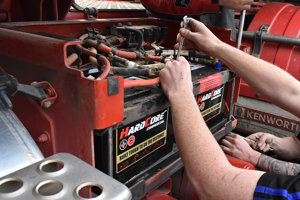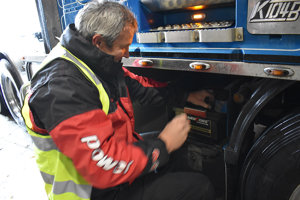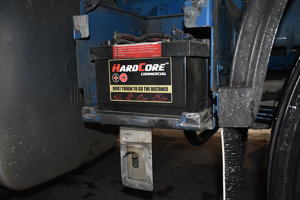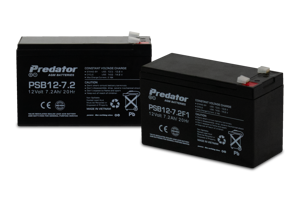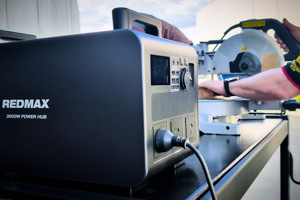How to Get the Most from your Truck Battery
One of the most crucial components of a truck is its batteries. Whether it’s for long-haul interstate transport to power the accessories in the overnight cabin or for local distribution in our cities, your trucks batteries are constantly pushed to their limits. In this article, we discuss the key factors to consider when selecting a truck battery and how to maximise performance and service life.

Types of Truck Batteries
Truck batteries serve two primary functions; to start the engine and to power auxiliary systems.
Starting or Cranking Batteries:
These batteries are responsible for providing the initial burst of energy needed to crank the engine. Their power is measured in Cold Cranking Amps (CCA) and they are designed to provide high cranking power rather than deliver repeated power cycles over time. Many trucks require more than one starting battery.
Auxiliary Deep Cycle Batteries:
Many trucks are also equipped with auxiliary batteries to provide power for a variety of equipment or accessories when the engine is not running. This application uses deep cycle batteries which designed to be discharged and charged (i.e. cycled) repeatedly. This includes lighting systems and cargo area lights, as well as refrigerators or freezers used when transporting perishable goods. Auxiliary batteries can also be connected to an inverter for running laptops, microwaves, heaters, air conditioners and other equipment required for driver comfort on long haul routes.
While these accessories are essential, they can drain the batteries when the engine is off. One of the best ways to protect a starting battery from being discharged by accessories is to use a battery isolator. A battery isolator ensures that the auxiliary battery and starting battery are kept separate when the engine is off. This allows the auxiliary battery to provide power for the accessories without discharging the starting battery.
Common Truck Battery Issues
Truck batteries are subjected to a variety of challenges due to the demands of large engines, high power demands and challenging driving conditions. Battery problems can affect vehicle performance, reliability, and longevity. Here are some of the most common problems truck owners face with their batteries:
- Discharged batteries – caused by either overuse or a parasitic drain on the battery when the vehicle is turned off.
- Corrosion on terminals – normally caused by over tightening the terminals during installation or some sort of impact on the terminal.
- Old or mismatched batteries – old batteries should be replaced before they fail. Replacing one battery from a set will result in additional battery failures, as the other batteries are normally at the end of their life as well.
Choosing the Right Battery for Your Truck
Choosing the correct battery is crucial for the truck’s reliability and longevity. When selecting a truck battery, consider the following factors:
1. Product Features and Specifications
- Capacity - Look for a battery with the correct capacity (measured in Ah) to ensure a sufficient energy reserve is available. Replacement batteries should have the same or a higher Ah rating as the original batteries.
- Cold Cranking Amps (CCA) - Ensure your battery has a CCA rating that meets or exceeds the original OEM truck battery ratings. This ensures it will have enough power to reliably crank the engine.
- Brand- Choose from reliable brands such as ACDelco , Delkor, HardCore , Predator or OPTIMA . These brands have proven track records and are known for their high quality products.
2. Upgrading to EFB or AGM Batteries
Some truck battery sizes are also available as an EFB or AGM. For trucks with high power demands, upgrading to an Enhanced Flooded Battery (EFB) or an Absorbent Glass Mat (AGM) battery can provide improved performance. These batteries offer increased resistance to deep cycling and vibration. EFB and AGM batteries are designed for durability and long lasting performance, making them ideal for commercial vehicles.
3. 12V vs. 24V Systems
Commercial vehicles can use either 12V or 24V battery systems. 12V systems are standard for most smaller trucks and passenger vehicles, while 24V systems are typically found in larger trucks or those used for heavy duty operations due to their higher power requirements. 12V systems in trucks will often use more than one 12V battery connected in parallel to provide a higher capacity and increased cranking current to the vehicle. 24V systems almost always use two 12V batteries connected in series to create a 24V system, with some vehicles using a combination of parallel and series to increase both battery capacity and system voltage.
For assistance in selecting the right battery for your truck, be sure to use handy tools like our Commercial Battery Finder or speak to the battery experts at your local R&J Batteries branch.
How to Get the Most from Your Truck Battery
Proper maintenance is paramount to getting the most out of a truck battery. Here are some tips to help prolong its lifespan:
1. Keep the Terminals Clean
Corrosion can build up on the battery terminals and posts over time. This can reduce the battery’s ability to charge properly and affect its overall performance. Use a REDMAX Battery Terminal Brush to clean the posts and terminals. If the batteries are exposed to high levels of water (e.g. spray from the wheels), place a thin smear of petroleum jelly on the posts before installing the terminals.
2. Test the State of Charge Regularly
Check the State of Charge (SoC) and State of Health (SoH) of the starting and auxiliary batteries regularly. A simple multimeter such as REDMAX Multimeter or a battery tester can help monitor voltage levels and identify any issues before they become a serious problem.
3. Inspect for Damage
Physically check the battery case for any cracks, leaks, or any other damage. Have your battery checked as soon as possible if any issues are identified, and replace it is necessary to reduce the risk of roadside failures
4. Use a Charger When Not in Use
If the truck is going to be parked for an extended period, use a charger to charge and maintain the battery. This helps prevent the battery from discharging and ensures it will be ready to go when needed.
5. Replace Batteries Together
For trucks with more than one battery in a system, it is advisable to replace all batteries at the same time. Replacing one battery while leaving the other can cause an imbalance and strain on the new battery, leading to a reduces service life.
The Last Word
A well maintained and reliable truck battery is essential for keeping a truck running smoothly and efficiently. By choosing the right truck battery and keeping it regularly maintained, many common issues, such as the ones we discussed in this article, can be avoided and extend the lifespan of the battery.
Visit your nearest R&J Batteries branch for personalised advice. Our team of experts can help you select the best battery for your truck’s needs, and our comprehensive product range ensures that you will find the perfect solution for your power needs.
